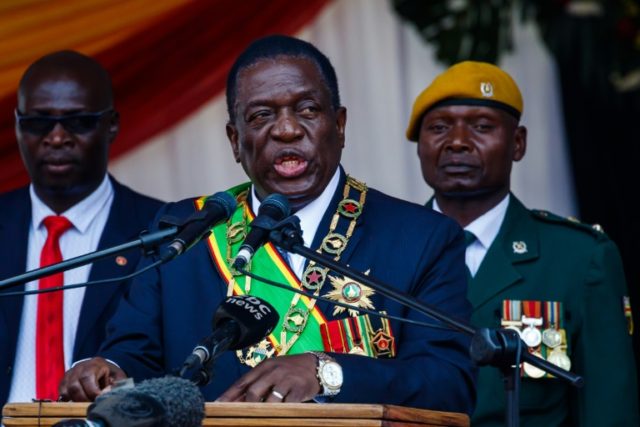President Emmerson Mnangagwa of Zimbabwe addressed the U.N. General Assembly on Wednesday, eager to promote the most urgent theme of the first administration after the fall of dictator Robert Mugabe: “Zimbabwe is open for business.”
He also addressed allegations of skulduggery in the recent election that secured his full term in office.
Mnangagwa took pains to assure the General Assembly his country is now on a path to “sustainable” and “equitable” development after decades of the Mugabe kleptocracy. He said his administration has made progress toward alleviating hunger and poverty.
Mnangagwa then asked to be credited for his good faith in allowing a free and fair election – not exactly a time-honored tradition in Zimbabwe – and insisted the allegations of ballot fraud and voter intimidation leveled against him by the opposition are not true:
Following my deliberate and conscious decision to open up the democratic space and emphatic call for peace, unity, and tolerance of divergent views amongst our people; political contestations, election campaigning, voting and counting processes were conducted freely, peacefully and transparently.
In the spirit of transparency and openness, a broader spectrum of international observers and global media houses were accredited to observe our elections. The exceptionally peaceful pre and post-electoral environment represented the maturing and entrenchment of democracy in Zimbabwe.
We are grateful to the UN and other Member States for sending Election Observer Missions and for the Technical Assistance received by our Election Management Body. The recommendations will be taken into account as we deepen our democratic and electoral processes.
We shall continue to entrench constitutionalism, democratic traditions and norms, peace unity and harmony; for it is indeed under such conditions that sustainable development, inclusive economic growth, and prosperity can occur.
Mnangagwa described riots in the capital of Harare after the election as “isolated and unfortunate” incidents of violence that were “regrettable and most unacceptable.”
He promised that political stability and economic reforms would make Zimbabwe a safe and attractive destination for international investment:
Zimbabwe is open for business and we are presently undertaking a raft of economic and political reforms to ensure an environment that facilitates inclusive and sustained economic growth. We have put in place institutions and instruments that maximize land utilization and increase agriculture productivity.
Equally, strategies are in place in the various sectors of our economy, to enable my country to enter the global value chains. The development and modernization of our roads, railways, airports, energy and ICT infrastructure is being accelerated in line with our regional and continental quest for enhanced connectivity and integrated infrastructure.
On matters of international politics, Mnangagwa called for the reform of international financial institutions, declared climate change “presents a threat to all humanity” and demanded action for the Palestinians and the Sahrawi of Western Sahara.
The Sahrawi are a predominantly Muslim ethnic group that seeks independence from Morocco, which annexed their territory in 1975. The Moroccans view Sahrawi separatists as violent insurgents who should be content with living in a largely autonomous district and have responded angrily to European and United Nations support for an independence referendum.
Reviews of Mnangagwa’s performance by U.N.-watchers were lukewarm at best. Ironically, Voice of America News quoted analysts who think he is too muted to follow up Robert Mugabe’s loud, theatrical, and incredibly destructive forty-year act. Mugabe generated a great deal of buzz by saying outrageous things in a florid off-the-cuff style, while Mnangagwa read a canned speech that was not easily distinguished from numerous other presentations to the General Assembly. Pan-Africanists miss the fiery, audacious champion they had in Mugabe.
On the other hand, Mnangagwa’s strategists might say his chief goal right now is to make Zimbabwe seem boring to attract sober investors looking for a few years without a coup or bloodshed in the streets.

COMMENTS
Please let us know if you're having issues with commenting.